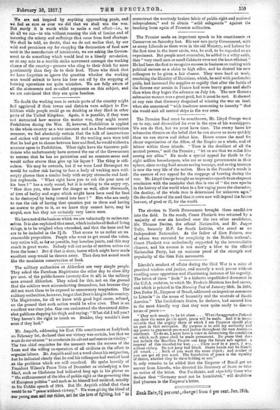No doubt the working men in certain parts of the
country might /eel aggrieved if their towns and districts were subject to Pro- hibition while people could go on drinking as they liked in other parts of the United Kingdom. Again, it is possible, if they were not instructed how serious the matter was, they might resent Prohibition during the War. If, however, Prohibition is applied to the whole country as a war measure and as a food-conservation measure, we feel absolutely certain that thatalk of insurrections and strikes will never materialize. If the working man were told that ho had got to choose between beer and food, he would without a murmur agree to Prohibition. What right have the timorous poli- ticians who unfortunately have secured the ear of the Government to assume that he has no patriotism and no common-sense and would rather starve than give-up his liquor ? The thing is ridi- eulous. We may be cowards, but if we were Lord - Dovonport we -would far rather risk having to face a .body of working men with empty glasses than a similar body with empty stomachs and food- less cupboards. " What right have you to rob the poor man of his beer ? " has a surly sound, but it is nothing to the angry cry, " How dare you, who knew the danger so well, allow thousands, of tons of barley-and sugar which might have been used for food to be destroyed 'by being turned into beer ? " Men who are ready to run the risk: of having- that question put to them and having .no.auswer to give to it, as we . know they cannot have, may be stupid, men but -they aro certainly very bravo ones.


































 Previous page
Previous page